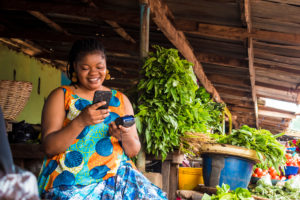On February 27, 2020, Nigeria announced its first COVID-19 case. Weeks later states in Nigeria including Lagos, Abuja, Rivers, and Kaduna, initiated full or partial lockdowns in a bid to slow down the spread of the virus.
While the aim of the lockdown is to save lives, stay-at-home directives will affect women in a number of ways and not all of them are pleasant. One thing we are likely to see is an increase in violence against women.
Violence is a daily reality for women and girls across Nigeria. According to the United Nations Population Fund (UNPFA) 28% of Nigerian women aged 25-29 have experienced some form of physical violence since age 15.
With self-isolation and social distancing, victims of abusive and women are stuck with their abusers and they are likely to face increased levels of sexual and domestic violence. According to Dorothy Njameze, a Sexually Based Gender Violence (SBGV) advocate and founder of Dorothy Njameze Foundation, calls from domestic violence victims have increased during the lockdown. These days she gets an average of 6-7 domestic violence cases daily. Cases she has to deal with include women being evicted from their homes and battering.
The restriction on all movement except providers of essential services makes it difficult for survivors to report abuse or seek help. Dorothy says shelters in Abuja have been shut down as they are not deemed as essential services. Likewise, the Lagos State Domestic and Sexual Violence Response Team (DSVRT) and government shelters have also been shut down. She further states that some victims of gender-based violence have resorted to social media to seek help, which in itself might not be the most secure way.
While restrictions are necessary to halt the spread of COVID-19, lockdown laws and policies prevent SGBV responders from addressing cases in real-time as states have different responses to the essential status of SBGV providers. For instance, at the time of writing this piece, Lagos does not recognize SBGV responders as essential service providers. Therefore, SGBV responders risk being arrested by law enforcement officials for violating lockdown regulations. On the other hand, the Abuja Municipal Council recognized SGBV responders as essential and have given them a pass to operate.
Despite the above, responding to crises in real-time remains a problem, Dorothy says. But civil society organizations have put in place initiatives to ensure victims of gender-based violence get the help they need despite the lockdown.
Beyond domestic violence, it is important to note that the militarization of some states has led to threats of violence towards women. In Warri, Delta State, male officers of the Nigerian Armed Forces in a 26-second video threatened to rape the women of Warri “skin to skin” and infect them with HIV in retaliation for the alleged murder of a soldier colleague in the state.
No Work, No Food
While violence and threats of violence against women persist during the lockdown, another threat that comes with being stuck at home is hunger. As noted for the Ebola outbreak, crises pose a serious threat to women’s engagement in economic activities. Dr Omowummi Omodunni Idowu, a development economist, and lecturer in the Department of Economics, Ekiti State University, is of the opinion that the lockdown will have a higher effect on single women, female-headed households and women in the informal sector.
In Nigeria, 72.3 % of workers are informally employed and considering the fact that 92% of women workers in developing countries are informally employed compared to 87 % of men, it is clear that a lockdown will cause economic hardship significantly for more women than men.
The urban poor women who work as street traders, construction laborers, and food vendors amongst others in cities such as Lagos are daily wage earners and live from hand-to-mouth. With no savings or means of earning a living “remotely” like those who work in the formal sector, these women are at risk of facing penury as economic activity grinds to a halt. For the majority, words like stay-at-home, stock-up, and social distancing are words of luxury that do not put food on the table. Dr. Omowummi says poor women in urban areas will sneak out of their homes to earn a living even against the government instruction and against their well-being.
Although it seems rural women in the informal sector will cope better than their urban counterparts, they will equally feel the pinch of the lockdown. Dr. Omowummi says that rural women could still be able to go to their farms but on the extreme, they may not be able to buy or sell and unconscious trade by barter may set in.
Thanks, But No Thanks
To relieve some of the economic pain caused by the lockdown and stay-at-home directives, some states and the Federal Government of Nigeria has announced measures such as cash interventions and food distribution programs. While these efforts are commendable, it seems these interventions are not gender-sensitive.
For instance, the Humanitarian Affairs Ministry commenced the payment of 20,000 Naira ($56) to the poor and most vulnerable households registered in the National Social Register of Poor and Vulnerable Households. However, it is unclear how many female-headed households or women within households will benefit from this scheme. Consequently, there are fears that these payments may not reach vulnerable women who need economic assistance.

Also, to support households and micro, small and medium enterprises affected by the COVID-19 pandemic, the Central Bank of Nigeria(CBN) announced a 50 billion Naira targeted credit facility ($140million). While households can potentially get up to 3 million Naira loans ($8,403), the CBN requires proof of collateral, such as personal property, which many poor women are unlikely to have.
The House of Representatives recently passed the Emergency Economic Stimulus bill, to provide a 50% tax rebate for employers and business owners who agree to not make staff cuts in 2020. The objectives of the bill also include protecting the employment status of Nigerians who might otherwise become unemployed as a consequence of management decision to retrench personnel in response to the prevailing economic realities. The bill is silent on provisions for informal workers.
The impact of the COVID-19 pandemic is not gender-neutral, as it affects men and women differently and women in different localities and classes differently. Therefore, governments and individuals must not be gender blind in their response to the pandemic or else women will carry disproportionately higher economic and emotional costs.

